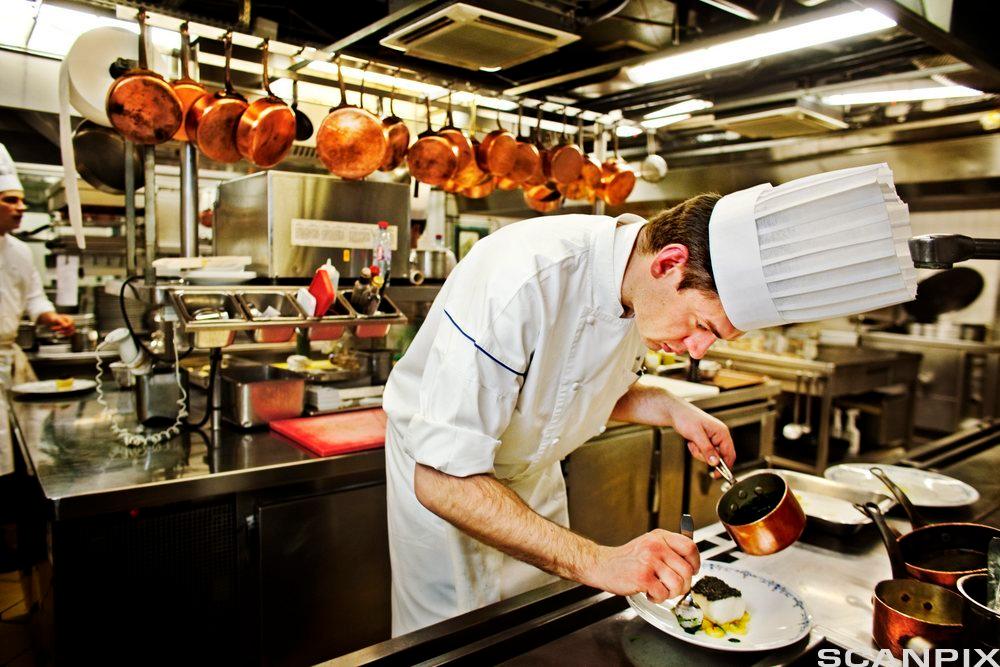Before listening, use the dictionary to check that you know the meaning of the following words: by default; from scratch; flair; palate; under pressure; catering; like-minded; cover; produce (noun); haven’t got a clue; the noughties is a term for the time period, 2000 to 2010.
A transcript of the interview
Can I just start by asking what your name and profession is?
My name is Ryan Winstanley and I’m a chef.
Whereabouts do you work, Ryan?
I work in a place called Busby and Wilds in Brighton.
Why did you choose to be a chef?
By default, really. My dad has been in the industry since he was seventeen and so I grew up in restaurants, not in restaurants but working in restaurants and going out. And my dad obviously, you know, been doing it for a long time, so I kind of fell into it that way really.
Could you perhaps talk through a typical day when you are at work?
A typical day is getting here between nine and ten. We make everything from scratch here, so there’s usually a decent list of things to prepare, which can be anything from making bread, roasting tomatoes, washing salad, making pies, making burgers up. And then we start service at 12 o’clock. Generally speaking, I’m done by about 3. Back at 6 for the evening service, so we do that until about 10 or 11 o’clock. That would be sort of a standard day’s work, really.
And what personal qualities do you think you need to be a chef?
Organisation. Obviously, a flare with food. Understanding the food palate. Patience. Working under pressure. Working in hot, uncomfortable environments. Not minding working weekends and evenings.
Could you describe one or two services that you provide?
I’ve done weddings, done catering for weddings. We’ve done outside catering with bars. What other services? Generally just try to provide, you know, good quality, reasonably priced food as possible. Try and keep it interesting. Try and differentiate ourselves from the average.
What do you like best and least about your job?
Best and least. Best I suppose is the people. You definitely get to make friends within the industry and like-minded people. Tend to be quite – what is the word? Insane, mental, crazy. Anyone of those things I think you need to be a bit different in the head to get through the days, when you’re doing 12–14-hour days. Kind of need the people around you to keep you going. That’s probably the best thing, along with cooking. Obviously cooking goes without saying. What do I like least? I mean you could always argue that working evenings and weekends, but that doesn’t really bother me so much. I’ve been doing it for the best part of twenty years. I get to go out on a Monday night, when it’s a little bit quieter. But, the thing that people dislike the most is everybody turning up at the same time, wanting to eat at the same time. That can be a little bit of a pain really. Trying to do thirty covers in the space of an hour, when you’ve got a tiny kitchen is never fun. That’s probably the least favourite of my – the least favourite thing that can happen as a chef.
How do you think cheffing will change in the future?
Well, I think it is changing slowly. I think, people – chefs and customers alike, are sort of going back to basics, is a simple way of putting it. I think the ’90s and early ’00s, it was all about fusion and trying to put as many different things on the plate and be as experimental as possible. But I think today, with the quality of British produce, with meat, fish, vegetables and fruit, chefs are sort of simplifying their dishes. Putting fewer things on the plate.
Fantastic. So finally, where do you see yourself in five to ten years’ time?
Where do I see myself in five to ten years? Honestly, I don’t know. Over the last thirteen years, I’ve lived in five different countries, in different places within those countries. So, cheffing is a great profession to have as a method of travelling, seeing the world and experiencing different cultures. To think where I might be in five, ten years – I haven’t got a clue really. It’s anyone’s guess, you know. If you told me a year ago I would be in Brighton, I would’ve laughed at you. But, here I am in Brighton now. We’ll see. Plans change. That’s what I’ve learned over the years, that whatever you decide to plan, that can change in the click of the fingers. So, I don’t know – somewhere – probably still cooking.
